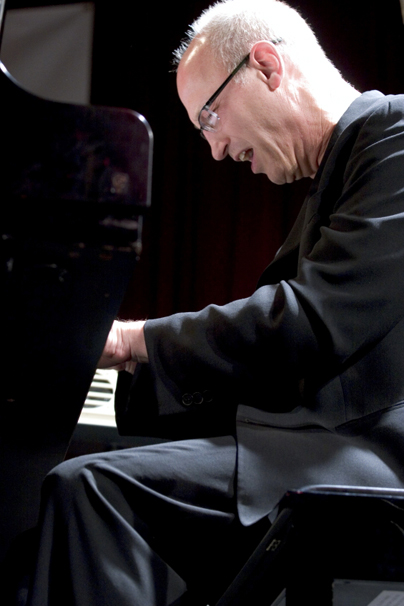Berg’s retooled “Blackbird” provides a highlight with Frost Wind Ensemble

Shelly Berg performed his freeform take on Lennon and McCartney’s “Blackbird” with the Frost Wind Ensemble Monday night at Festival Miami.
There were several reasons for the large audience at Monday night’s Frost Wind Ensemble concert at Gusman Concert Hall to take heightened interest in the main work on the program, Jonathan Leshnoff’s Clarinet Concerto. The general classical repertory contains few showpieces for clarinet, and Leshnoff’s concerto was commissioned by the Philadelphia Orchestra and premiered last April. Also, Leshnoff’s compositions have been getting increasing attention recently, including a co-commission by Carnegie Hall and the Atlanta Symphony. He’s a composer on the rise.
Sub-titled “Nekudim,” Leshnoff’s 22-minute concerto received fine advocacy from Philadelphia Orchestra principal clarinetist Ricardo Morales, for whom it was written, and the Frost Wind Ensemble under conductor Robert Carnochan. Prior to the performance, Leshnoff remarked that “nekudos” are the vowels in the Hebrew language, notated by points and lines, that give the consonants sound, much like a clarinetist’s breath gives his instrument voice.
This idea was realized in the slow, dawn-like opening minutes, in which Morales sounded like he was slowly waking up his clarinet. Impressive contributions from the Frost Ensemble’s flutes (a strength all night) and horns and full-bodied trombones blended nicely with Morales’ smooth, rich tone. Leshnoff has remarked that the outer movements’ long legato lines pose the greatest challenge for the soloist, and Morales met these challenges with expressive, seamless playing that articulated Leshnoff’s lyrical inclinations.
The second movement, sub-titled “Chesed,” or kindness, is the literal and figurative heart of the work, rollicking and jazzy with strong hints of John Adams and, most obviously, Copland’s Clarinet Concerto. The Frost’s admirable brass provided an undercurrent of urgency that propelled the movement while never undercutting Morales’ virtuosity. The third movement, similar to the first, is pensive and slow, concluding softly.
Leshnoff’s concerto is a showpiece for the clarinet’s atmospheric beauty and soulfulness. But although the work is entertaining, it’s neither complex nor revelatory, offering few challenges for the listener and leaving the impression that we’ve heard most of it before.
The same can’t be said about Shelly Berg’s arrangement of John Lennon and Paul McCartney’s “Blackbird.” The words “chilling” and “exciting” have probably never been used to describe a performance of “Blackbird,” but it’s also unlikely that many have been as memorable as this one.
Berg, dean of the UM Frost School of Music, told the audience that McCartney wrote the song in 1968 as a metaphor for the burgeoning civil right movement. Berg read the lyrics, “Blackbird singing in the dead of night/Take these broken wings and learn to fly/All your life/You were only waiting for this moment to arise,” then, without further comment, sat down at his piano to play.
Certainly, it’s easy these days to see political meaning in musical performances, but here it was unmistakable. After all, how many performances of “Blackbird” have opened with dissonant flutes followed by clarinet, oboe and bassoon joining in for what sounded like “Blackbird” reflected in a funhouse mirror? Berg held back on releasing the famous melody, and even when he did, it came in stops and starts, a “Blackbird” fluttering but restrained against its will. Consecutive solos on bass by Lowell Ringel and drumset by Marcus Grant were jazzy but innervating, and when the dissonant flutes returned, it seemed as if the piece would end with emotional devastation.
But there was more. There was hope as Berg finally unleashed the main melody, his echoing tone heartbreakingly beautiful, before he improvised, seemingly, to a gospel-like conclusion. The Frost Ensemble provided more than just able accompaniment; it was a character of its own in this musical statement of despair and hope.
The concert opened with Aaron Copland’s An Outdoor Overture, conducted by Chee Wing Yim, a doctoral candidate at the Frost School. Assertive, dynamic trumpets and trombones highlighted the early moments of a performance that was nicely paced and occasionally expansive but mostly workmanlike.
Carnochan led the Ensemble in what was billed as a “preview performance” of Brandon Scott Rumsey’s Wanderlust (the piece will have its official premiere later this month in Australia). The brief work, lasting about six minutes, sounds like deconstructed Copland and is marked by enveloping waves of sound in ascending and descending scales, alternately calm (the harps, of course) and unsettling (most notably the drums and lower brass).
Festival Miami continues with the Frost Symphony Orchestra and mezzo-soprano Robynne Redmond 8 p.m. Friday at UM Gusman Concert Hall in Coral Gables. festivalmiami.org
Posted in Performances
Leave a Comment
Tue Feb 7, 2017
at 11:36 am
No Comments






